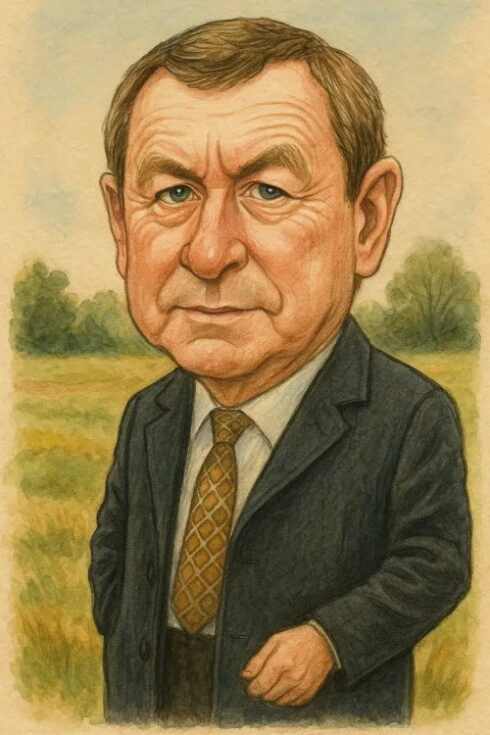Early Life & Background
John Nettles was born on October 11, 1943, in St Austell, Cornwall. He grew up in the South West of England, where his love for storytelling began. Even as a child, he was drawn to history and performance.
After completing school, Nettles studied history and philosophy at the University of Southampton. However, his passion for acting soon took over. He trained as an actor and began working in theatre. As a result, he quickly built a reputation for thoughtful, grounded performances.
Breakthrough Role: Jim Bergerac in Bergerac
In 1981, Nettles landed the role that made him a household name. He starred as Detective Sergeant Jim Bergerac in the BBC series *Bergerac*. The show, set in the Channel Islands, ran for nine successful seasons.
Bergerac was unlike typical television detectives. He was flawed, recovering from alcoholism, and dealing with a failed marriage. Yet, Nettles made him relatable and human. His portrayal blended toughness with vulnerability, which resonated with viewers.
The island of Jersey provided a unique backdrop. Crimes ranged from fraud to murder, while local politics and tight-knit communities added complexity. Despite Bergerac’s personal struggles, he remained determined to seek justice. Nettles’ performance struck the perfect balance between grit and charm.
Because of this, *Bergerac* stood apart from other detective shows. It combined personal drama with crime-solving, all while showcasing Jersey’s scenic beauty. Consequently, Nettles became one of Britain’s leading television stars.
Defining Role: Tom Barnaby in Midsomer Murders
Although *Bergerac* made him famous, Nettles’ next major role brought him international acclaim. In 1997, he became DCI Tom Barnaby in *Midsomer Murders*. Based on Caroline Graham’s novels, the series offered a darker twist on village life.
*Midsomer Murders* follows Barnaby as he solves crimes in the fictional county of Midsomer. The peaceful countryside often hides sinister secrets. Eccentric characters, bizarre motives, and high body counts became hallmarks of the show.
Nettles played Barnaby with calm authority. His character relied on observation, patience, and intelligence. Moreover, Nettles’ subtle humour added warmth to the often grim investigations.
Over 13 years and 81 episodes, Nettles anchored the series. His portrayal kept the tone consistent, even as the crimes became more elaborate. Consequently, *Midsomer Murders* became a global hit, broadcast in over 100 countries.
Acting Style & Broad Appeal
John Nettles is known for his understated, intelligent performances. He avoids overacting, instead focusing on realism and subtle character development. As a result, his detectives feel authentic and relatable.
Both Jim Bergerac and Tom Barnaby are principled but imperfect. They face personal challenges while upholding the law. Nettles excels at revealing their vulnerabilities without weakening their authority.
In addition, his quiet charisma draws viewers in. He portrays investigators who succeed through intellect and empathy rather than aggression. This approach set him apart from other TV detectives of his time.
Notable Work Beyond His Detectives
- The Liver Birds (1970–1971) – An early comedy role that showcased his versatility.
- Poldark (1975) – A period drama where Nettles displayed his ability to handle ensemble casts.
- The Channel Islands at War (2010) – A documentary series reflecting his deep interest in history.
- Documentary Narration – His distinctive voice has brought many factual programmes to life.
- Stage Career – Nettles has appeared in major theatrical productions, including with the Royal Shakespeare Company.
Awards, Honours & Industry Impact
In 2010, Nettles was appointed OBE for services to drama. His performances earned both critical acclaim and public admiration. Moreover, *Bergerac* and *Midsomer Murders* became cultural staples due to his involvement.
Nettles redefined the British television detective. His characters are grounded, complex, and morally conscious. Consequently, his work influenced many modern crime shows worldwide.
Personal Life & Interests
Despite his fame, Nettles values privacy. He married Cathryn Sealey in 1995 and prefers a quiet, grounded life. Outside of acting, he enjoys history, writing, and exploring nature.
During his time filming *Bergerac*, Nettles developed a strong connection to the Channel Islands. He later authored books and documentaries about the region, showcasing his historical curiosity.
Legacy of Bergerac & Midsomer Murders
John Nettles transformed the image of the TV detective. Jim Bergerac introduced viewers to a flawed, introspective investigator. Barnaby, on the other hand, was methodical, steady, and quietly witty.
Because of these performances, both series achieved lasting popularity. *Bergerac* remains a cult favourite. *Midsomer Murders*, meanwhile, continues to entertain audiences globally.
Nettles balanced eccentric storylines with grounded performances. His work made the shows believable, even when the crimes were bizarre. Furthermore, he paved the way for character-driven, emotionally rich detective dramas.
Cultural Influence & Global Reach
Nettles’ performances resonated worldwide. *Midsomer Murders* airs in over 100 countries, while *Bergerac* retains its loyal fanbase. His portrayals highlighted British culture, blending tradition with humanity.
As a result, Nettles became an ambassador for British crime drama. His detectives are respected, flawed, and deeply human. Many modern shows reflect his influence, with characters prioritising intellect and empathy over brute force.
Final Word
John Nettles remains a defining figure in British television. His work on *Bergerac* and *Midsomer Murders* shaped crime drama for decades. Through intelligence, restraint, and authenticity, he created iconic detectives.
Audiences connected with his relatable flaws and quiet authority. His legacy is clear in every modern detective driven by complexity and compassion. John Nettles remains one of Britain’s most respected actors and storytellers.
